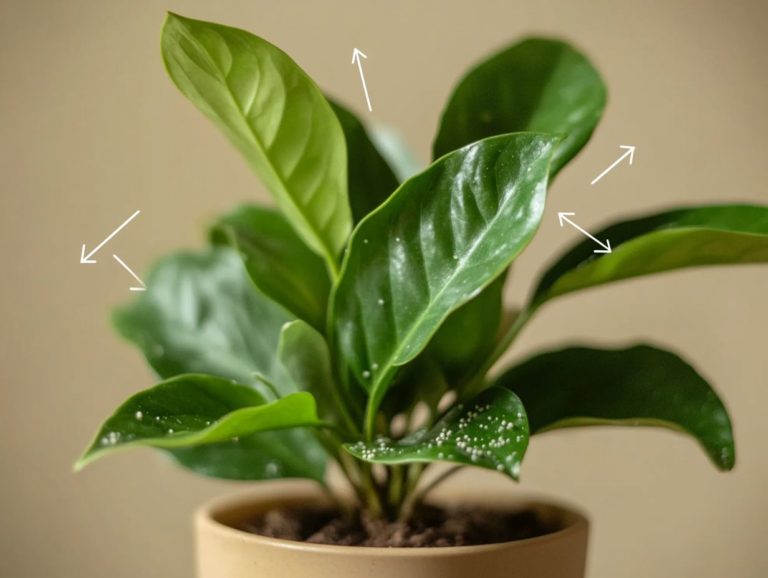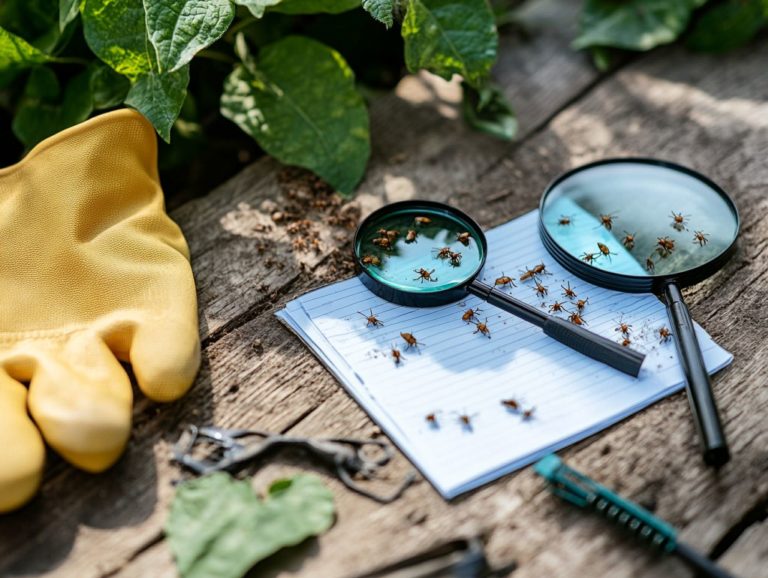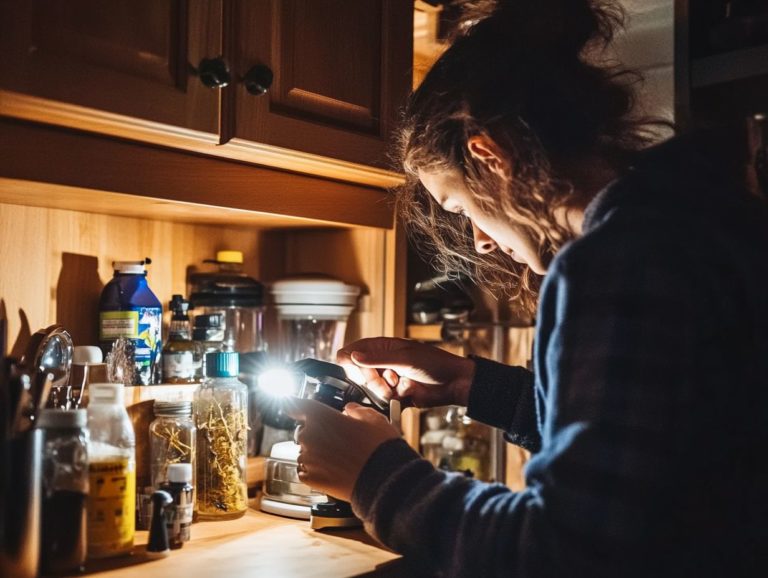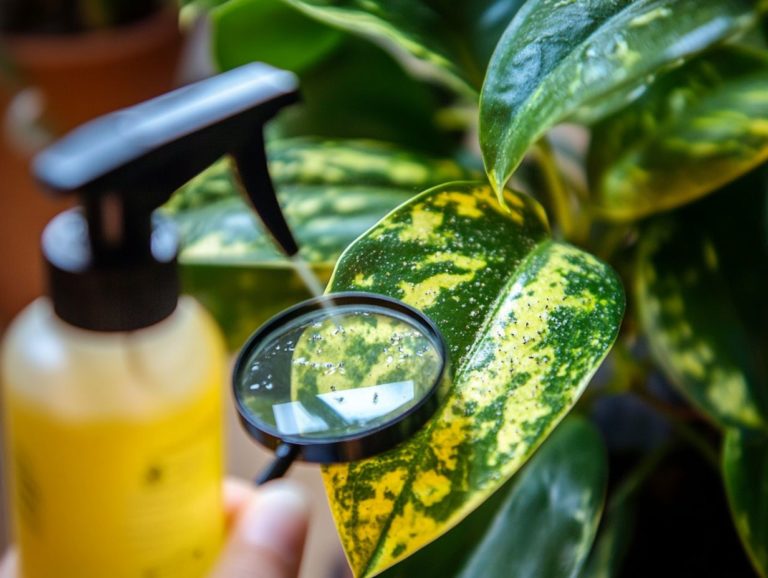Chemical Vs. Organic Pest Control for Plants
Effective pest control is key to thriving plants, whether you re cultivating a vibrant garden or tending to a few pots on your windowsill.
With many methods available, understanding the advantages and disadvantages of both chemical and organic pest control helps you make informed choices that fit your needs.
This article explores how chemical treatments work, discussing the benefits and drawbacks of each approach. You’ll find valuable tips for selecting the best method for your plants.
By blending both strategies, you can create a balanced pest management plan that keeps your greenery flourishing beautifully.
Contents
- Key Takeaways:
- Chemical Pest Control for Plants
- Organic Pest Control for Plants
- Choosing the Right Pest Control Method for Your Plants
- Combining Chemical and Organic Pest Control
- Frequently Asked Questions
- 1. What s the difference between chemical and organic pest control?
- 2. Which type of pest control is more effective for plants?
- 3. Is organic pest control safe for plants and the environment?
- 4. Are there any potential risks associated with chemical pest control for plants?
- 5. What are the benefits of using organic pest control for plants?
- 6. Can I use a combination of chemical and organic pest control for plants?
Key Takeaways:

- Chemical pest control uses synthetic chemicals to eliminate pests on plants. While effective, it can negatively impact the environment and human health.
- Organic pest control relies on natural methods and products, such as beneficial insects and plant-based repellents. It s a safer, environmentally friendly option, though it may not work as quickly as chemical control.
- When choosing a pest control method, consider factors like the severity of the infestation, potential harm to non-target organisms, and your personal values. In some cases, combining chemical and organic methods can be effective.
Understanding the Importance of Pest Control
Pest control is crucial for maintaining ecological balance and protecting the health of crops, humans, and the environment.
In agriculture, using effective ways to handle pests is essential for increasing crop yields and minimizing losses from infestations. You can choose from various methods, including chemical pest control and organic management, each with different implications for health and the ecosystem.
While chemical solutions may provide quick results, they often leave harmful residues that can affect human health and disrupt natural habitats. Organic pest control focuses on utilizing natural enemies, such as beneficial insects, and employs practices that promote ecological integrity.
This approach reduces environmental harm and boosts soil health, leading to a more resilient agricultural system that benefits everyone.
Chemical Pest Control for Plants
Many gardeners use chemical pest control as a common strategy for managing pest populations, employing synthetic pesticides to quickly eliminate harmful pests. However, this method raises significant health concerns and environmental risks.
While you might appreciate the fast results that chemical methods provide, it’s important to recognize that they can leave pesticide residues, potentially disrupting ecosystems and harming non-target organisms.
How it Works and Common Chemicals Used
Chemical pesticides are designed to target specific pest behaviors and physiological processes. They use various active ingredients to disrupt the life cycles of harmful organisms threatening your crops. Common chemicals include neonicotinoids, glyphosate, and pyrethroids, all aimed at enhancing pesticide effectiveness while minimizing harm to beneficial insects.
These chemicals interfere with biological processes in pests, such as their nervous systems or essential metabolic functions, leading to their demise. For instance, neonicotinoids effectively target sap-sucking insects like aphids by blocking vital neural pathways.
Glyphosate, a staple in weed management, targets a specific enzyme pathway found only in plants and certain microorganisms, showcasing its precision. However, applying these pesticides raises valid concerns about their impact on non-target species and the broader ecosystem. This emphasizes the importance of careful pest identification and management to maintain a balanced environment.
Start creating your balanced pest control plan today!
Summary: Both chemical and organic pest control methods have their pros and cons. Understanding these can help you choose the best strategy for your plants, ensuring healthy growth while minimizing environmental impact.
Benefits and Drawbacks

The advantages of chemical pest control are quite clear: you get rapid results and wide coverage of pest populations. This means your crops can be protected almost immediately.
However, don t overlook the significant drawbacks that need your immediate attention. The risk of pesticide toxicity, potential health hazards for humans and animals, and negative impacts on the environment are all serious concerns that spark conversations about the sustainability of these methods.
While quick action can certainly save yields and bolster food security, the long-term consequences often raise eyebrows. Particularly concerning are the health risks associated with chronic exposure. Research indicates that certain pesticides can disrupt endocrine functions (the hormonal systems in our bodies) and lead to respiratory problems, underscoring the urgent need for responsible management.
Environmental stewardship becomes paramount, as chemical runoff poses a threat to water sources and endangers biodiversity. Striking a balance between effective pest management and safeguarding ecological integrity is no small feat. It demands careful consideration and innovative approaches to navigate this complex challenge effectively.
Organic Pest Control for Plants
Organic pest control offers an eco-friendly alternative to traditional methods. It employs natural methods and products like neem oil and diatomaceous earth to manage pest populations.
This strategy allows you to effectively address pest issues while avoiding the harmful effects of synthetic chemicals. By embracing this approach, you not only support sustainable agricultural practices but also foster biodiversity and enhance the overall health of the ecosystem.
Natural Methods and Products
Natural methods for pest control encompass the use of organic pesticides and biological control, highlighting the invaluable role of natural predators and beneficial insects in effectively managing pest populations.
By embracing these methods, you can significantly reduce your reliance on harmful chemicals while fostering healthier ecosystems. In this approach, you can identify specific pests and introduce their natural predators, such as ladybugs or lacewings, which thrive on common nuisances like aphids.
Organic pesticides derived from plant extracts can target pests without endangering beneficial species, ensuring a harmonious ecosystem. By honing in on pest identification, you can deploy traps and natural repellents to keep unwanted visitors at bay.
This strategy not only creates a safer environment but also nurtures biodiversity, ultimately contributing to long-term soil health and the vitality of your plants.
Pros and Cons
The advantages of organic pest control are clear: it s eco-friendly and fosters ecological balance. However, it s essential to be aware of the drawbacks, such as limited effectiveness and potentially higher costs compared to chemical alternatives.
Let’s dive into how effective organic methods really are! Their success often hinges on the specific pests you re dealing with and the treatments you choose. While many swear by natural solutions like neem oil or insecticidal soaps for satisfactory results, you might discover that these options require more frequent applications and a longer timeframe to achieve noticeable effects.
Health concerns play a crucial role in this decision-making process. Organic options typically reduce exposure to harmful chemicals, promoting wellness for both your family and pets.
However, weighing the effectiveness against the potential increase in labor and investment can present a challenging dilemma for homeowners like yourself. Explore your pest management options today and choose what s best for your home and environment.
Choosing the Right Pest Control Method for Your Plants

Selecting the ideal pest control method for your plants requires a careful consideration of various pest management strategies that match your goals. Whether you prioritize swift results, environmental safety, or long-term sustainability, it’s essential to consider what matters most to you.
The effectiveness of these methods can differ based on the specific pest issues you are facing and the environmental impact of the approach you decide to adopt.
Factors to Consider
When choosing a pest control method, consider the specific pest problems you face and the size of the pest populations.
It’s also important to think about the potential environmental safety of your chosen strategies. By understanding these elements, you can achieve more effective pest management outcomes.
Evaluating the long-term impact of your control techniques on local ecosystems is vital in your decision-making process. Whether you lean towards chemical treatments or consider natural alternatives, it s crucial to assess their effectiveness and how well they harmonize with the surrounding flora and fauna.
The application techniques, timing, and life cycle stages of pests greatly influence the success of your pest management efforts, ensuring the methods you choose align with eco-friendly principles while effectively addressing infestations.
Combining Chemical and Organic Pest Control
Combining chemical and organic pest control methods gives you a powerful way to tackle pest issues effectively, allowing you to leverage the strengths of each while minimizing their weaknesses.
This integrated pest management (IPM) strategy, known as Integrated Pest Management, focuses on combining different methods to manage pest populations effectively, enabling you with the flexibility to apply chemical alternatives alongside organic methods, enhancing efficacy and significantly reducing the risk of developing pest resistance.
When and How to Use Both Methods
Knowing when and how to utilize both chemical and organic pest control methods is essential for a successful pest management strategy that works! This adaptability allows you to refine your approach based on pest identification and the ever-changing environmental conditions.
For example, applying organic solutions during the early stages of pest development can effectively disrupt their life cycle, while chemical treatments may be the better choice for more extensive infestations. By understanding the specific vulnerabilities of pests throughout different seasons, you can implement more targeted interventions.
In certain situations, a combined approach leveraging organic deterrents followed by targeted chemical applications can create a comprehensive strategy that addresses both immediate threats and long-term pest reduction. Consequently, keeping an eye on environmental factors, such as weather patterns and local wildlife, alongside identifying pests, becomes essential in determining the most effective methods to employ.
Frequently Asked Questions
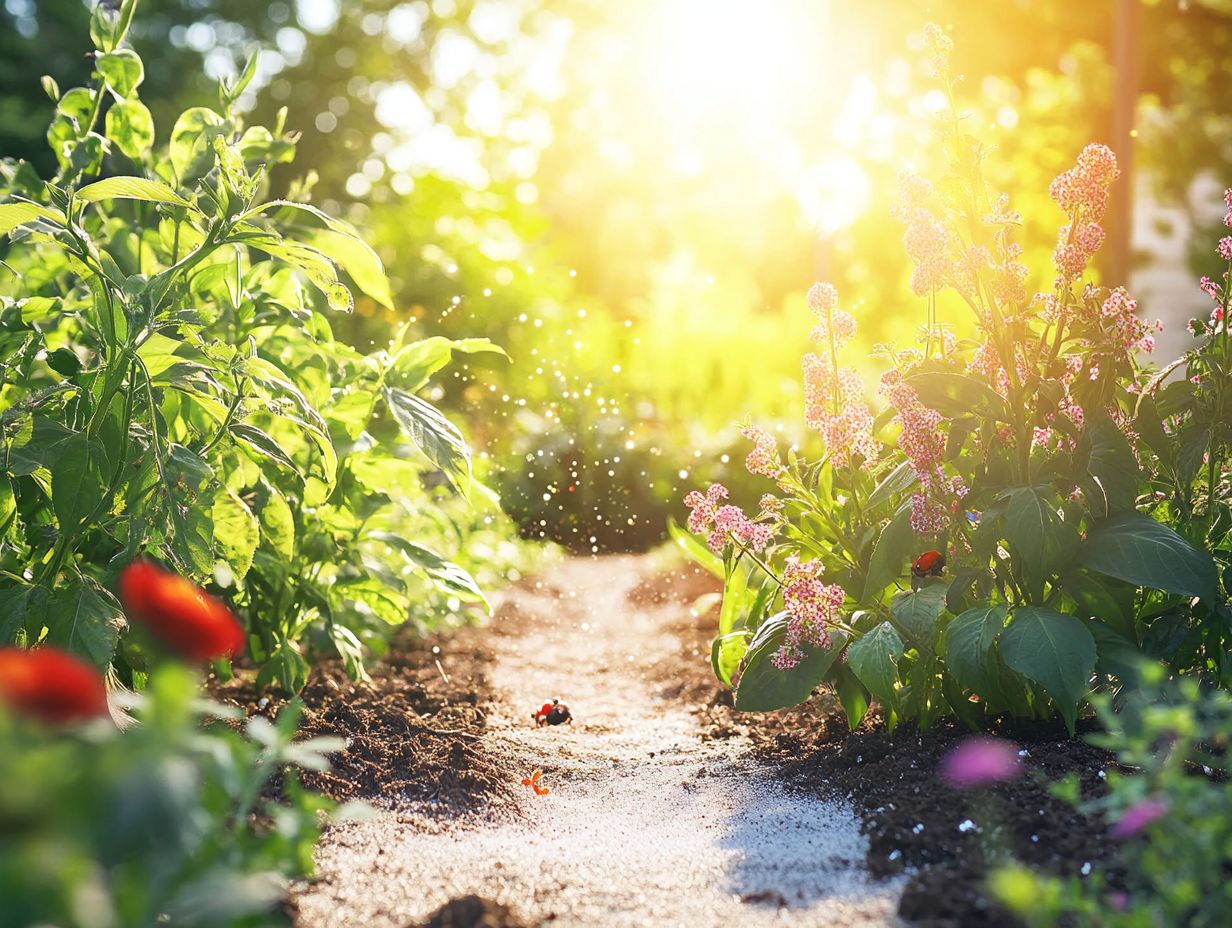
1. What s the difference between chemical and organic pest control?
The main difference between chemical and organic pest control is the use of synthetic chemicals. Chemical pest control uses synthetic pesticides, while organic pest control relies on natural methods and ingredients.
2. Which type of pest control is more effective for plants?
Both chemical and organic pest control methods can be effective, but it ultimately depends on the type of pest and the severity of the infestation. Chemical pest control may provide quicker results, but organic methods can be just as effective in the long run.
3. Is organic pest control safe for plants and the environment?
Yes, organic pest control is generally safer for plants and the environment because it does not use harmful chemicals. However, it is important to properly follow instructions and use caution when handling any type of pest control product.
4. Are there any potential risks associated with chemical pest control for plants?
Yes, chemical pest control can harm plants, animals, and even humans.
These substances may also affect beneficial insects and pollinators, disrupt ecosystems, and contaminate soil and water.
5. What are the benefits of using organic pest control for plants?
Organic pest control ensures your plants are safer and healthier!
It protects beneficial insects and promotes a sustainable approach to managing pests.
6. Can I use a combination of chemical and organic pest control for plants?
Yes! You can use both methods together.
This approach, known as integrated pest management (IPM), combines various techniques to manage pests effectively while focusing on prevention and reducing chemical usage.

